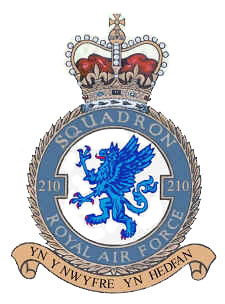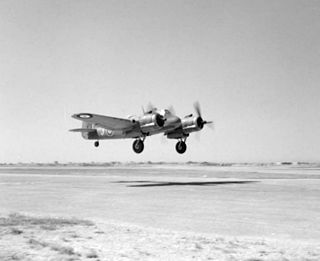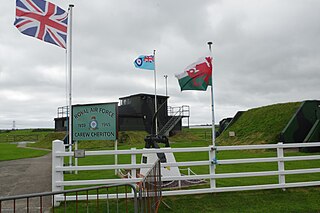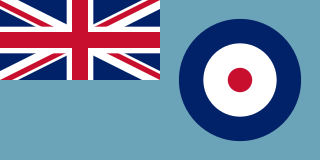
No. 7 Squadron of the Royal Air Force operates the Boeing Chinook HC6 from RAF Odiham, Hampshire.

No. 220 Squadron of the Royal Air Force (RAF) was founded in 1918 and disbanded in 1963 after four separate periods of service. The squadron saw service in both the First and Second World Wars, as a maritime patrol unit, and finally as part of Britain's strategic nuclear deterrent.

No. 138 Squadron RAF was a squadron of the Royal Air Force that served in a variety of roles during its career, last disbanded in 1962. It was the first 'V-bomber' squadron of the RAF, flying the Vickers Valiant between 1955 and 1962.
No. 119 Squadron RAF was a squadron of the Royal Air Force, flying with RAF Coastal Command during the Second World War. It was the only RAF unit flying the Short G class and Short C class flying boats.

No. 253 Squadron was a flying squadron of the Royal Air Force between 1918 and 1947. Originally formed in 1918, it served in WW1 flying coastal reconnaissance and anti-submarine patrols. Later in WW2 it took part in the Battle of France, the Battle of Britain, and then fought in the Mediterranean Theatre of Operations in Algeria. The squadron was disbanded on 16 May 1947, and briefly revived as a night-fighter squadron from 18 April 1955 to 2 September 1957.
No. 61 Squadron was a squadron of the Royal Air Force. It was first formed as a fighter squadron of the British Royal Flying Corps during the First World War. It was reformed in 1937 as a bomber squadron of the Royal Air Force and served in the Second World War and after, until disbanded in 1958.

No. 205 Squadron was a Royal Air Force unit formed on 1 April 1918. Prior to this it had existed as No. 5 Squadron of the Royal Naval Air Service (RNAS). In 1929, it became the first RAF squadron to be permanently based in Singapore, taking as its motto Pertama di Malaya. No. 205 Squadron operated during the Second World War and the Cold War before disbanding on 31 October 1971.

No. 210 Squadron was a Royal Air Force unit established in the First World War. Disbanded and reformed a number of times in the ensuing years, it operated as a fighter squadron during the First World War and as a maritime patrol squadron during the Spanish Civil War, the Second World War and the Cold War before it was last deactivated in 1971.
No. 104 Squadron RAF is a former squadron of the British Royal Air Force.

No. 235 Squadron RAF was an anti-submarine squadron of the Royal Air Force in World War I and in World War II served as a squadron in RAF Coastal Command.
Number 76 Squadron was a squadron of the Royal Air Force. It was formed during World War I as a home defence fighter squadron and in its second incarnation during World War II flew as a bomber squadron, first as an operational training unit and later as an active bomber squadron. With the end of the war the squadron converted to the role of transport squadron, to be reactivated shortly in the bomber role during the 1950s. From 2007 to 2011, it was a training unit, equipped with the Short Tucano at RAF Linton-on-Ouse.

Royal Air Force Carew Cheriton, or more simply RAF Carew Cheriton, is a former Royal Air Force station located near Carew, Pembrokeshire. It was situated 4.7 miles (7.6 km) north west of Tenby.
No. 110 Squadron RAF was a unit of the British Royal Air Force, initially formed as a bomber squadron during the First World War. Re-formed during the Second World War, again as a bomber squadron, it was re-formed twice more post-war, firstly as a transport, and then a helicopter squadron, before being disbanded in 1971.

No. 250 (Sudan) Squadron RAF was a Royal Air Force squadron which disbanded in January 1947. It initially formed during May 1918 as a reconnaissance and anti–submarine unit in the First World War, disbanding in May 1919. It reformed as a fighter unit in the Second World War, in April 1941.

No. 223 Squadron RAF was a squadron of the Royal Air Force. Originally formed as part of the Royal Naval Air Service (RNAS), the Squadron flew in both World Wars.

No. 103 Squadron was a Royal Air Force bomber squadron during World War I, World War II and the Cold War, switching to helicopters in the late 1950s until it was disbanded for the last time in 1975.
No. 254 Squadron of the Royal Air Force was the designation of a number of units formed throughout the 20th century.
No. 244 Squadron RAF was a Royal Air Force Squadron formed as an anti–submarine unit in World War I and a bomber and anti-submarine unit in the Middle East in World War II.

No. 15 Group was a group of the Royal Air Force, which disbanded in 1945. It was operational in the last year of, and just after, the First World War, a reformation saw it active throughout the Second World War.

RAF Iceland is a former Royal Air Force command which controlled RAF units within Iceland. The command was operational between July 1941 and July 1945 during the Second World War, the unit was previously No. 30 Wing RAF.












